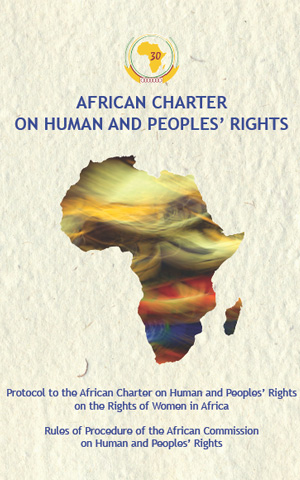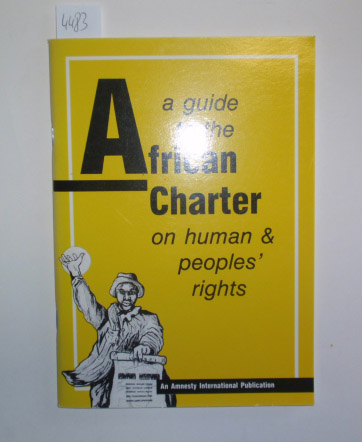The African Constitution On Human And Peoples’ Rights: A Cornerstone Of African Human Rights Regulation
The African Constitution on Human and Peoples’ Rights: A Cornerstone of African Human Rights Regulation
Associated Articles: The African Constitution on Human and Peoples’ Rights: A Cornerstone of African Human Rights Regulation
Introduction
With enthusiasm, let’s navigate by way of the intriguing subject associated to The African Constitution on Human and Peoples’ Rights: A Cornerstone of African Human Rights Regulation. Let’s weave attention-grabbing data and provide contemporary views to the readers.
Desk of Content material
The African Constitution on Human and Peoples’ Rights: A Cornerstone of African Human Rights Regulation

The African Constitution on Human and Peoples’ Rights (ACHPR), adopted in 1981 and entered into power in 1986, stands as a landmark achievement within the discipline of worldwide human rights legislation. It represents a singular contribution, not just for its complete scope encompassing each particular person and collective rights, but in addition for its contextualization throughout the particular realities and challenges of the African continent. Not like different regional human rights devices, the ACHPR explicitly acknowledges the significance of cultural and historic elements in shaping human rights safety, thereby providing a framework that resonates deeply with African societies.
A Distinctive Mix of Particular person and Collective Rights:
The Constitution’s distinctiveness lies in its progressive integration of particular person and collective rights. Whereas it ensures basic human rights akin to the proper to life, liberty, and safety of individual, freedom of expression, affiliation, and faith, it additionally emphasizes the rights of peoples. These collective rights, together with the proper to self-determination, improvement, and a wholesome setting, are essential for understanding the Constitution’s holistic strategy to human rights safety. This emphasis on collective rights displays the African understanding of human dignity as being inextricably linked to the well-being of the neighborhood.
The precise to self-determination, as an example, shouldn’t be merely a political proper but in addition a foundational proper underpinning different rights. It acknowledges the proper of peoples to freely decide their political standing and pursue their financial, social, and cultural improvement. This provision has been instrumental in supporting struggles for independence and liberation throughout the continent. Equally, the proper to improvement, a comparatively novel idea in worldwide human rights legislation on the time of the Constitution’s adoption, acknowledges the significance of financial and social progress as important for the enjoyment of different human rights. It emphasizes the duty of states to create situations conducive to the event of their populations.
Particular Provisions and their Significance:
The ACHPR accommodates a complete vary of provisions overlaying numerous points of human rights. Some notable provisions embrace:
-
Article 4: Proper to Life: This ensures the proper to life and prohibits arbitrary deprivation of life. It has been interpreted to incorporate protections towards extrajudicial killings, police brutality, and different types of state-sponsored violence.
-
Article 5: Proper to Integrity of the Particular person: This protects people from torture, merciless, inhuman, or degrading therapy or punishment. This provision has been instrumental in difficult practices akin to flogging and different types of corporal punishment.
-
Article 6: Proper to Liberty and Safety of Particular person: This ensures the proper to liberty and safety of individual, prohibits arbitrary arrest and detention, and ensures the proper to a good trial. This provision has been used to problem illegal detentions and guarantee entry to justice.
-
Article 9: Proper to a Truthful Trial: This provision ensures the proper to a good and public listening to by a reliable, impartial, and neutral tribunal established by legislation. It units out necessary procedural ensures, together with the proper to authorized illustration and the presumption of innocence.
-
Article 10: Proper to Truthful Labour Practices: This ensures the proper to work, truthful wages, and secure working situations. This provision has been used to problem exploitative labour practices and advocate for higher working situations for staff throughout the continent.
-
Article 17: Proper to Schooling: This acknowledges the proper to schooling and the obligation of states to make major schooling obligatory and accessible to all. This provision has been instrumental in selling entry to schooling, notably for marginalized teams.
-
Article 18: Proper to Well being: This ensures the proper to the enjoyment of the very best attainable normal of bodily and psychological well being. It emphasizes the state’s duty to create situations conducive to good well being, together with entry to healthcare providers.
The African Fee on Human and Peoples’ Rights:
The African Constitution established the African Fee on Human and Peoples’ Rights (ACHPR), a quasi-judicial physique chargeable for monitoring the implementation of the Constitution. The Fee receives complaints from people, NGOs, and states, investigates human rights violations, and makes suggestions to states. Whereas the Fee lacks the facility of direct enforcement, its selections and suggestions carry vital ethical and political weight and have performed an important function in shaping human rights requirements and practices throughout the continent. The Fee’s work has been instrumental in elevating consciousness of human rights points, selling dialogue between states and civil society, and fostering the event of nationwide human rights mechanisms.
Challenges and Limitations:
Regardless of its vital contributions, the ACHPR faces a number of challenges. The enforcement mechanisms of the Constitution are comparatively weak in comparison with different regional human rights programs. The Fee’s reliance on states’ cooperation for investigations and implementation of its selections can hinder its effectiveness. Moreover, the shortage of a strong judicial mechanism, akin to a devoted court docket, limits the Constitution’s enforcement energy. Political will and capability constraints inside states additionally pose vital challenges to the efficient implementation of the Constitution’s provisions. Battle, instability, and weak governance buildings in some elements of the continent additional complicate the duty of defending human rights.
The African Courtroom on Human and Peoples’ Rights:
The institution of the African Courtroom on Human and Peoples’ Rights (AfCHPR) in 2004 represents a major step in direction of strengthening the enforcement mechanisms of the ACHPR. The Courtroom has jurisdiction to listen to instances from states which have ratified its Protocol and from people and NGOs underneath sure situations. Nevertheless, the Courtroom’s effectiveness continues to be restricted by the comparatively small variety of states which have ratified its Protocol and the challenges of guaranteeing its independence and impartiality.
The Way forward for the African Constitution:
The African Constitution on Human and Peoples’ Rights stays an important instrument for selling and defending human rights in Africa. Its distinctive mix of particular person and collective rights, its give attention to the particular context of the African continent, and its emphasis on improvement and self-determination proceed to be related and impactful. Nevertheless, strengthening its enforcement mechanisms, enhancing the capability of nationwide establishments, and fostering higher political will are essential for guaranteeing the Constitution’s full realization. The continuing efforts to strengthen the African Courtroom, promote ratification of the Protocol, and improve the capability of nationwide human rights establishments are important steps in direction of attaining this objective. The way forward for the ACHPR lies in its continued evolution and adaptation to the altering realities of the continent, whereas upholding its core ideas of human dignity, justice, and equality. Its success hinges on the collective dedication of African states, civil society organizations, and people to translate its noble aspirations into tangible enhancements within the lives of all Africans. The Constitution, subsequently, stays a dynamic and evolving instrument, adapting to the altering wants and challenges of the continent whereas striving to construct a future the place human rights are absolutely revered and guarded for all.







Closure
Thus, we hope this text has supplied beneficial insights into The African Constitution on Human and Peoples’ Rights: A Cornerstone of African Human Rights Regulation. We hope you discover this text informative and useful. See you in our subsequent article!
